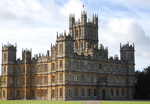Who should inherit titles?
As the Royal succession bill allows for the first born child of the Duke and Duchess of Cambridge to be next in line to the throne, regardless of sex, Country Life asks whether titled families should be able to follow suit


All being well, in less than a month, The Duchess of Cambridge will give birth to a child that will be in the line of succession to inherit the throne. As a result of the Succession to the Crown Act 2013, which came into law in April, this will be an unequivocal fact whether the child is festooned in pink ribbons or slipped into an Aston Villa Babygro.
It displays the Royal Family's sure-footedness over constitutional matters by adapting to the modern age. But as well as helping the institution of monarchy to evolve, it begs a question as much as it answers one. Will landed and titled families follow suit? If not, they may look hamstrung and out of touch.
Already, members of these families have been calling on the Government to end the ?outdated and manifestly unfair' laws of succession. The Countess of Clancarty, wife of the 9th Earl of Clancarty and mother of one daughter, said the aim of the campaign was to achieve ?equality for women in the peerage'. Lord Trefgarne told the House of Lords that the royal succession Bill had ?set running the hare of what happens to the hereditary peerage'.
You may well ask why the majority of us should be worried about the nomenclature of a tiny sliver of our society? Yes, it makes a good story for Downton Abbey or an intriguing historical fictional dilemma for father of five daughters Mr Bennet in Pride and Prejudice, patiently enduring the oleaginous charms of Mr Collins. But what is the relevance to 21st-century Britain?
When you reflect that the beauty of our countryside has been largely thanks to the dedicated stewardship of country-estate owners, then the issue becomes one that should concern us all. Historic properties are one of the most frequently cited reasons for tourists to visit this country, according to the Historic Houses Association. For centuries, landed families have cosseted and nurtured their acres with the obsessive enthusiasm of a keen gardener for a rare orchid; the integrity of estates has been maintained by the sometimes ruthless rule of leaving all to one.
** Subscribe to Country Life; Country Life on Ipad
Primogeniture has provided us with a national asset. In France, the Code Napoléon may be more egalitarian, but it hasn't served the preservation of the national heritage well and the division of the spoils for each generation has eventually resulted in families being unable to agree about the disposal of the shared assets as the base of the pyramid of beneficiaries ever widens.
Sign up for the Country Life Newsletter
Exquisite houses, the beauty of Nature, and how to get the most from your life, straight to your inbox.
But even if we subscribe to the notion that entailing estates to one child is acceptable and preferable, the idea that girls should be excluded from inheriting titles seems old-fashioned, not to mention illogical. It's less likely these days that a father will slavishly seek out the distant cousin and leave him the place where his daughters grew up just so the title and house can stay together, but when the historical bond between property and hereditary title is broken, it's one less reason to devote one's life to the preservation of the family seat.
Viscount Coke, heir to the Earl of Leicester, who runs the Holkham estate in Norfolk, confesses that he would like to keep the estate in the immediate family. He has a son, but concedes that his eldest child, a daughter, would be perfectly capable of taking up the reins when the time comes. ?The most important things are the land and the estate. I'm not against the idea of a daughter taking over.' Several large estates are being run today by women such as Claire Birch at Doddington Hall and Miranda Rock at Burghley. In Scotland, it's more common for women to inherit titles. The Countess of Sutherland and the late Dame Flora MacLeod even inherited the chiefships of their respective clans.
Some caution against the effect on well-laid plans of inheritance and succession planning. If a child has been brought up to expect a certain future, they point out that it would be harsh and potentially damaging to family unity to suddenly whip it away.
We can look to Spain for a recent example where the law has changed with immediate effect. There, women have always been able to inherit titles in the absence of sons, but, under new rules, it is now the eldest child who inherits the title. ?It hasn't been smooth sailing. It's very, very hard on the boys,' a constitutional expert in Madrid admits. ?But I think people are getting used to it.' Strangely, the Spanish royal family hasn't entered the debate. The Crown Prince has two daughters, but if his wife became pregnant again, the pressure to act would be considerable.
Unlike in Spain, a new law in this country would not need to be retrospective but could include any heirs born from now on. There would be other consequences to a change in the law, but there's no reason why these details can't be overcome. In Spain, the husbands of women who inherit titles take the male version of the title themselves.
The idea of a Dowager Duke may take a little getting used to, but, with the potential of a queen of England in waiting, the path to change is already being cleared.
* Follow Country Life magazine on Twitter
Country Life is unlike any other magazine: the only glossy weekly on the newsstand and the only magazine that has been guest-edited by HRH The King not once, but twice. It is a celebration of modern rural life and all its diverse joys and pleasures — that was first published in Queen Victoria's Diamond Jubilee year. Our eclectic mixture of witty and informative content — from the most up-to-date property news and commentary and a coveted glimpse inside some of the UK's best houses and gardens, to gardening, the arts and interior design, written by experts in their field — still cannot be found in print or online, anywhere else.
-
 'To exist in this world relies on the hands of others': Roger Powell and modern British bookbinding
'To exist in this world relies on the hands of others': Roger Powell and modern British bookbindingAn exhibition on the legendary bookbinder Roger Powell reveals not only his great skill, but serves to reconnect us with the joy, power and importance of real craftsmanship.
By Hussein Kesvani
-
 Spam: The tinned meaty treat that brought a taste of the ‘hot-dog life of Hollywood’ to war-weary Britain
Spam: The tinned meaty treat that brought a taste of the ‘hot-dog life of Hollywood’ to war-weary BritainCourtesy of our ‘special relationship’ with the US, Spam was a culinary phenomenon, says Mary Greene. So much so that in 1944, London’s Simpson’s, renowned for its roast beef, was offering creamed Spam casserole instead.
By Country Life